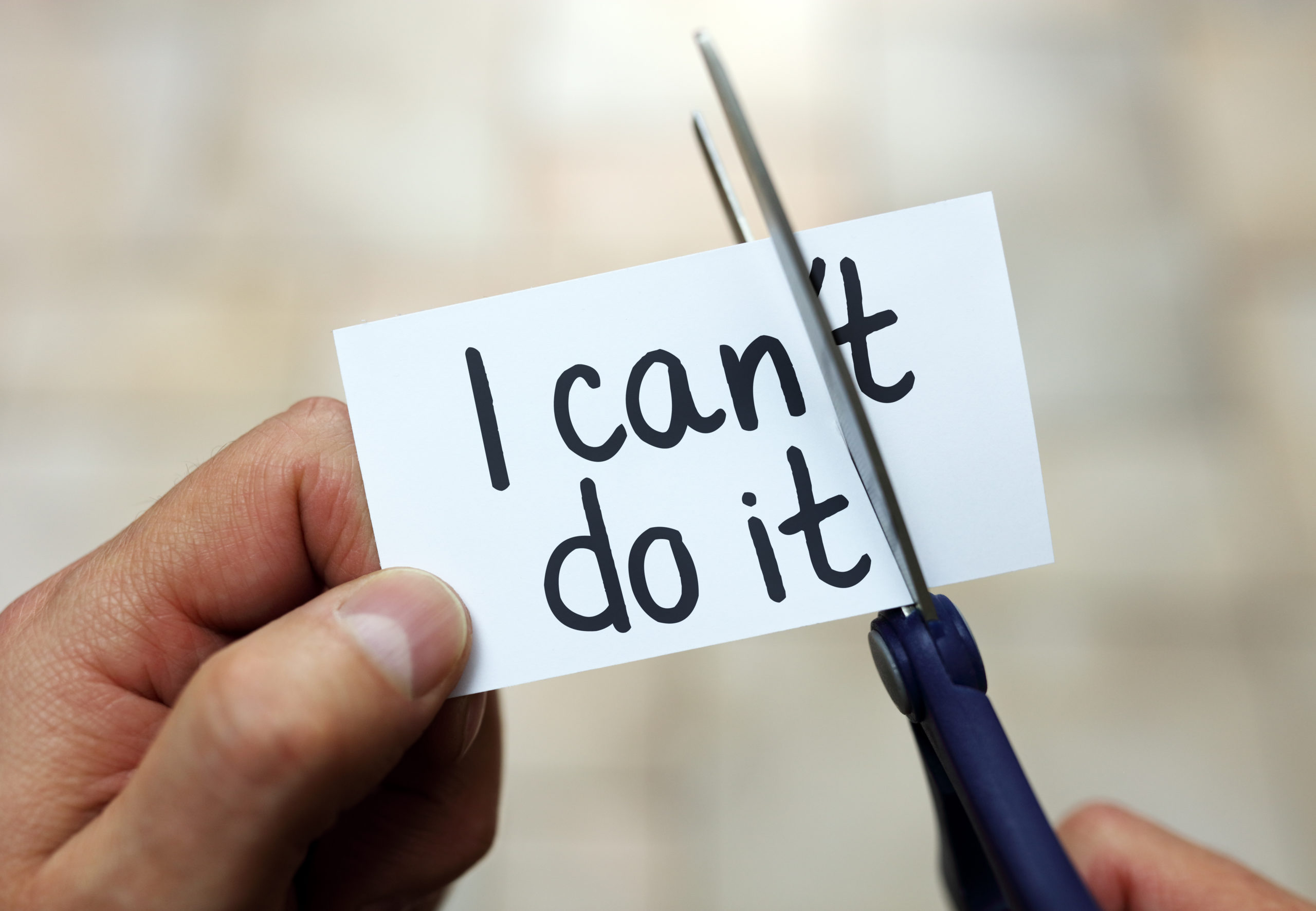
In the complex dance of human relationships, understanding attachment styles is akin to unravelling the intricacies of our emotional connections.
Attachment theory, developed by psychologist John Bowlby, explores how our early experiences with caregivers shape our expectations, behaviours, and beliefs in adult relationships.
In this blog post, I will delve into the four attachment styles—secure, anxious-preoccupied, dismissive-avoidant, and fearful-avoidant—and examine how they can significantly impact the dynamics of your relationships. ✨
1. Secure Attachment Style: The Foundation of Healthy Relationships
Individuals with a secure attachment style generally had caregivers who were consistently responsive to their needs during childhood.
This sense of reliability and trust translates into secure adults who feel comfortable with intimacy and autonomy. In relationships, those with a secure attachment style tend to form strong emotional bonds, communicate openly, and navigate conflicts effectively. They are more likely to seek and provide support, fostering a sense of safety and security for both partners. 😊
How it Affects Relationships:
- Positive Communication: Secure individuals are generally adept at expressing their needs and emotions. They create an open space for their partners to do the same, promoting healthy communication.
- Emotional Support: Secure individuals are comfortable with emotional intimacy, making them reliable sources of support for their partners during challenging times.
- Trust and Commitment: Due to a positive early caregiving experience, those with a secure attachment style tend to trust more easily and are more committed to maintaining a stable relationship. ❤️
2. Anxious-Preoccupied Attachment Style: Seeking Reassurance and Affection
Arising from inconsistent caregiving during childhood, the anxious-preoccupied attachment style is characterised by a constant need for reassurance and fear of abandonment.
Individuals with this attachment style often worry about their partner’s feelings, leading to heightened sensitivity to perceived threats in the relationship. They may be perceived as clingy or overly dependent, seeking constant validation and approval. 😣
How it Affects Relationships:
- Intense Emotional Expression: Anxious-preoccupied individuals are prone to heightened emotional expression, seeking continuous affirmation of their partner’s love and commitment.
- Fear of Abandonment: The fear of rejection or abandonment can lead to moments of insecurity and overanalysing behaviors, potentially causing strain on the relationship.
- Communication Challenges: While expressive, anxious-preoccupied individuals may struggle with effective communication, as their fears can sometimes override rational discourse.
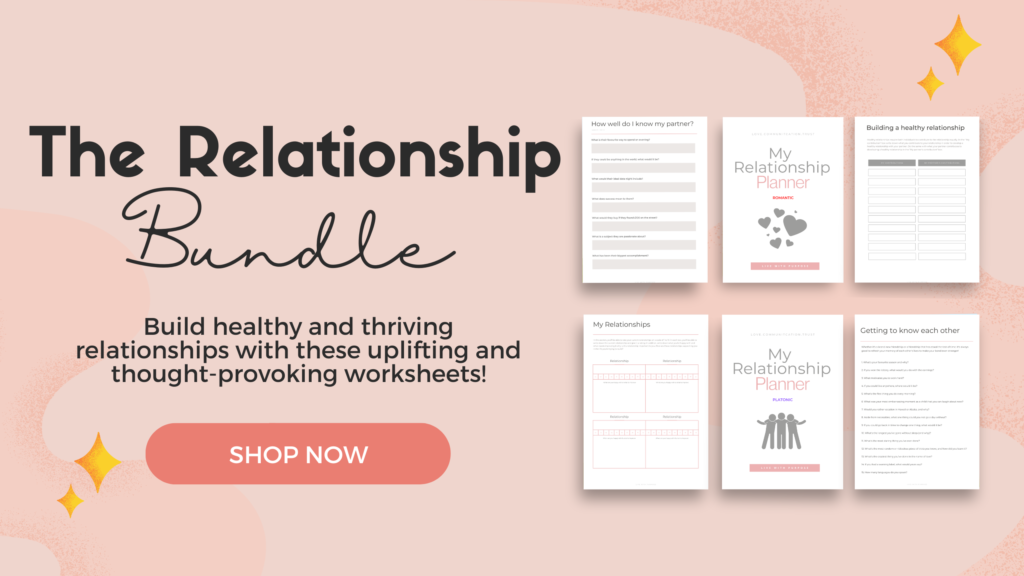
3. Dismissive-Avoidant Attachment Style: Independence and Emotional Distance
Individuals with a dismissive-avoidant attachment style often experienced caregivers who were emotionally distant or inconsistent in responding to their needs. 😥
As a result, these individuals have learned to downplay the importance of emotional intimacy and may value independence and self-sufficiency. They may appear emotionally distant, avoiding deep emotional connections and expressing discomfort with vulnerability.
How it Affects Relationships:
- Difficulty Expressing Emotions: Dismissive-avoidant individuals may find it challenging to express their own emotions or respond empathetically to their partner’s emotional needs.
- Tendency Toward Independence: Independence is highly valued, and these individuals may struggle with the idea of relying on others or being relied upon in the context of a relationship. 😭
- Fear of Intimacy: Emotional intimacy may be perceived as a threat, leading to a preference for maintaining distance and avoiding deep emotional connections.
4. Fearful-Avoidant Attachment Style: A Balancing Act of Push and Pull
Individuals with a fearful-avoidant attachment style often experienced inconsistent caregiving, with moments of responsiveness and neglect.
This unpredictability can create internal conflict, leading to a fear of both intimacy and abandonment. Fearful-avoidant individuals may oscillate between a desire for closeness and the need for space, making relationship dynamics complex. 🫂
How it Affects Relationships:
- Ambivalence Toward Intimacy: Fearful-avoidant individuals may desire closeness but fear the vulnerability that comes with it, leading to a push-and-pull dynamic in relationships.
- Difficulty Trusting: Trust issues can arise due to past experiences of inconsistency, making it challenging to fully trust a partner’s intentions or commitment.
- Need for Independence: Similar to the dismissive-avoidant style, there is a desire for independence, but this is often counteracted by a simultaneous yearning for connection. ❤️
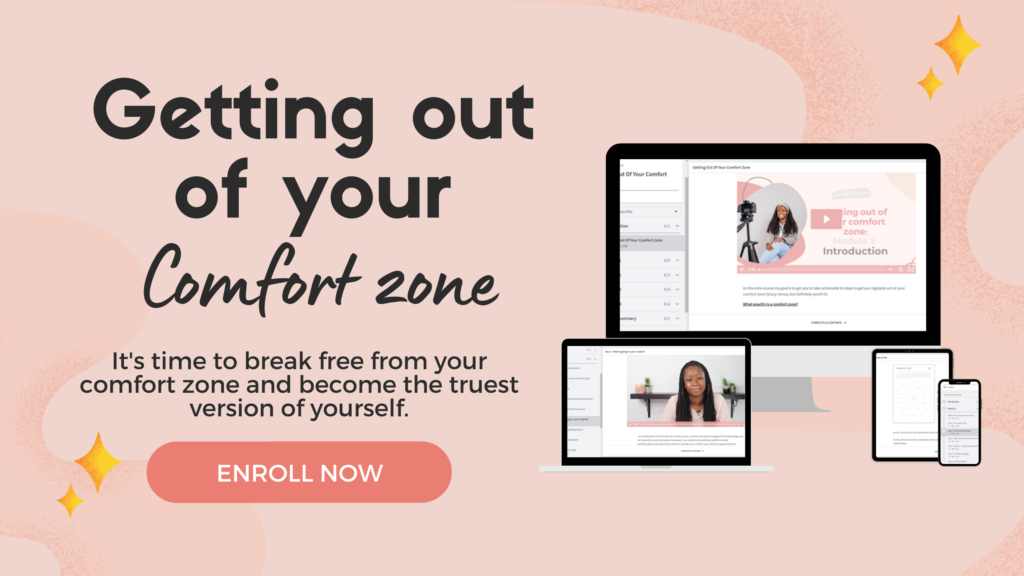
Navigating Attachment Styles in Relationships:
Understanding your own attachment style and that of your partner is a crucial step in building healthy and fulfilling relationships. Here are some strategies to navigate the impact of attachment styles:
1. Self-Reflection:
Take time to reflect on your own attachment style. Understanding your patterns of behavior and emotional responses provides insight into your needs and potential challenges in relationships. 🔥
2. Open Communication:
Foster open and honest communication with your partner about attachment styles. Discussing your emotional needs, fears, and expectations creates a foundation for mutual understanding.
3. Empathy and Compassion:
Approach your partner with empathy and compassion, recognising that attachment styles are deeply rooted in early experiences. Avoid judgment and work together to create a supportive environment. 💕
4. Seeking Professional Guidance:
If challenges persist, consider seeking the guidance of a therapist or counselor. Professional support can provide valuable insights and tools to navigate attachment-related issues. You’re not alone.
5. Building Secure Attachments:
Focus on creating a secure attachment within the relationship. This involves consistent emotional responsiveness, trust-building, and effective communication. Foster an environment where both partners feel safe to express their needs and vulnerabilities. ❤️
6. Individual Growth:
Encourage personal growth and self-awareness. Individuals with insecure attachment styles can work towards developing more secure patterns through introspection, therapy, and intentional efforts to challenge maladaptive behaviors.
Conclusion
Attachment styles serve as blueprints for our emotional connections, shaping the way we approach and experience relationships. By recognising the impact of attachment styles, whether secure, anxious-preoccupied, dismissive-avoidant, or fearful-avoidant, we gain valuable insights into our own behaviors and the dynamics of our relationships.
Navigating these attachment styles requires self-awareness, open communication, and a commitment to fostering secure attachments. 🥰
In the journey of love, understanding and embracing the complexities of attachment styles can pave the way for deeper connections, healthier communication, and more fulfilling relationships. As we unravel the intricacies of our emotional bonds, we discover the power to transform patterns, create secure attachments, and build a foundation for lasting and meaningful connections.
Pin this post for a reminder 📌 👇

Related Blogs
Things to Say “No” to for you to Live a Happier Life
How to Stop Settling For Less Than You Deserve
How to Become the Best Version of Yourself: A Guide For 20-Somethings
Sometimes we tend to settle for less than what we deserve in any type of relationship, be it a romantic relationship or a relationship with friends and family. 👨👩👦
It’s an unconscious habit that several people deal with every single day. The reason behind this could be your own insecurities regarding your relationship or issues with your self-esteem.
If you are in a healthy relationship with your loved ones, you will never feel that you are compromising or that your expectations are being shattered. To analyze whether you are living the life of your dreams or a compromise, look around yourself.
Ask yourself these questions:
👉Is this where I want to be in my life?
👉Is this the life that I always wanted to build for myself?
👉Am I working towards building a great life for myself?
If your answer to these questions is no, then you’re not leading a passionate and fulfilling life. Make it your life’s motto to not settle for less than what you deserve in terms of your career and your relationships.
If you do not realize your full potential in life, then you’re settling for the better part of it. It might be hard to admit this habit at first, but when you do, it’s time to take the following measures to stop settling for less in your life.
15 Ways To Stop Settling For Less Than What You Deserve In Life
1. Set Boundaries In Your Relationships
If you feel that your family, friends, or romantic partner might be hurting your self-esteem or constantly impacting your life in a negative way, then it’s time to set some boundaries. 🙅♀️ But, again, it is imperative that you be assertive about what you’re okay with and what you aren’t.
To be treated well, you need to make your loved ones understand your boundaries and figure out whether they’re willing to make the requisite changes or not. Ultimately, if your guts tell you that you aren’t being treated well or accepted, then it’s time to move on from that relationship.

2. Stop Being A Pushover
When you’re so desperate to get accepted and appreciated in your friend circle, it is easy to resort to being a pushover. However, any relationship, be it a friendship or a romantic one, works only if both the people involved put 100% of their effort in it.
No one needs half-assed relationships. 💁♀️
Therefore, if you get the feeling that you’re the only one who’s putting in the majority of hard work, then think of it as a sign that you’re probably around the wrong person.
It’s better to find someone else who would appreciate your time and efforts and be willing to provide you with the same level of commitment.
3. Stop Making Excuses For Someone’s Poor Behaviour
If you want to learn how to stop settling in life, you must stop making excuses for anybody’s poor behavior. If you find yourself frequently making excuses for a close friend or family member, then it’s time to bid goodbye to this habit.
In the long run, this habit can affect your peace of mind and make your relationship with that person toxic.
Peace of mind >>> Having someone you don’t need in your life 🤷♀️
Instead of making excuses for your loved ones, try to have a chat with them about what hurts you about their behavior.
If that person invalidates your feelings instead of appreciating them, it’s probably because you’ve been settling for less than what you deserve.

4. Don’t Think Of Being Alone As An Abandonment
If you find yourself alone in certain situations, it doesn’t mean that your loved ones have abandoned you or that something is wrong with you. 😬
Instead, you must learn how to be alone with yourself without being burdened by lousy friendships or other relationships.
This will not only teach you to be independent in life but also boost your self-esteem in the long run. Being comfortable with who you are is one of the first steps you must take if you want to stop settling for less in your life.
RELATED: Ready to get out of your comfort zone and experience the life you know you deserve? Yes!? Then this is the mini-course for you 👇

5. Express Your Hopes, Desires, And Expectations
You can’t expect the people around you to treat you the way you want them to if you don’t fully communicate your hopes, desires, and expectations to them.
So get into the habit of telling your loved ones what you desire, whether big or small. Talk about any inconveniences you’re facing and how you’d love for the people around you to support you through such situations.
No one can read your mind, make it known! 🗣️
6. If You Don’t Like Something, Then Don’t Agree With It.
If you want to stop settling for less in life, then you need to break the cycle of saying yes to anything and everything.
When you continue to say yes to doing things or accepting things that you don’t personally agree with, you start to build a life that is no longer on your terms which will eventually damage the relationship you have with yourself. 🙁
To break this habit, whenever somebody asks you to perform a certain task, take a slight pause and ask yourself if this is something you really want to do.
If the answer to this question is a yes, you can go ahead with the task, and if it is a no, you must say it out loud.

7. Invest Your Time And Money In Self-Care
The biggest lesson in this guide is how to stop settling in life; you need to realize your self-worth and value the same. To get out of negative situations, you must practice self-love and do more than just the bare minimum for your body, mind, and soul.
The relationship that one has with themselves is the most important and the most nurturing one. 💕
Therefore, investing your time and money into caring for yourself will indeed be a turning point in your journey in life.
To do this, you can invest in a healthy skincare routine, do regular meditations for your peace of mind, pay attention to your nutritional requirements, etc. 🥗
8. Relive Your Hobbies And Passion
When you get into the habit of settling for less in life for a long time, your personal interests, hobbies, and passion can take a back seat in life.
It’s time to change that. 💁♀️
To overcome this, sit down and note the things you’re passionate about. Look at your current daily routine and see where you can fit at least one passion a week into your schedule.

9. Say Your Feelings Out Loud
If you’ve been hurting for a long time, you might have developed invisible walls around you that stop you from communicating your feelings out loud.
To overcome this, you need to build a cycle of healthy communication with your loved ones and tell them what’s hurting you.
Sometimes we all end up settling for less in life when we do not attempt to correct the hurtful comments or behavior of the people around us.
Therefore, you must make your voice and feelings heard and then make the necessary decisions based on how the people around you accept those feelings. 🤷♀️
Wrapping Up – How to stop settling for less than you deserve
Our emotional barriers and low self-esteem can sometimes make us undervalue ourselves. Therefore, you need to understand the difference between what you’re getting and what you deserve to stop settling for less in life.
You will have to pay attention to your needs and demands and be willing and courageous to walk away if those demands can’t be fulfilled. 🤷♀️
I hope that the above guide on how to stop settling in life helps fuel your journey towards self-healing and promotes building a healthy relationship with your loved ones and yourself.
Pin this post for a reminder 📌 👇
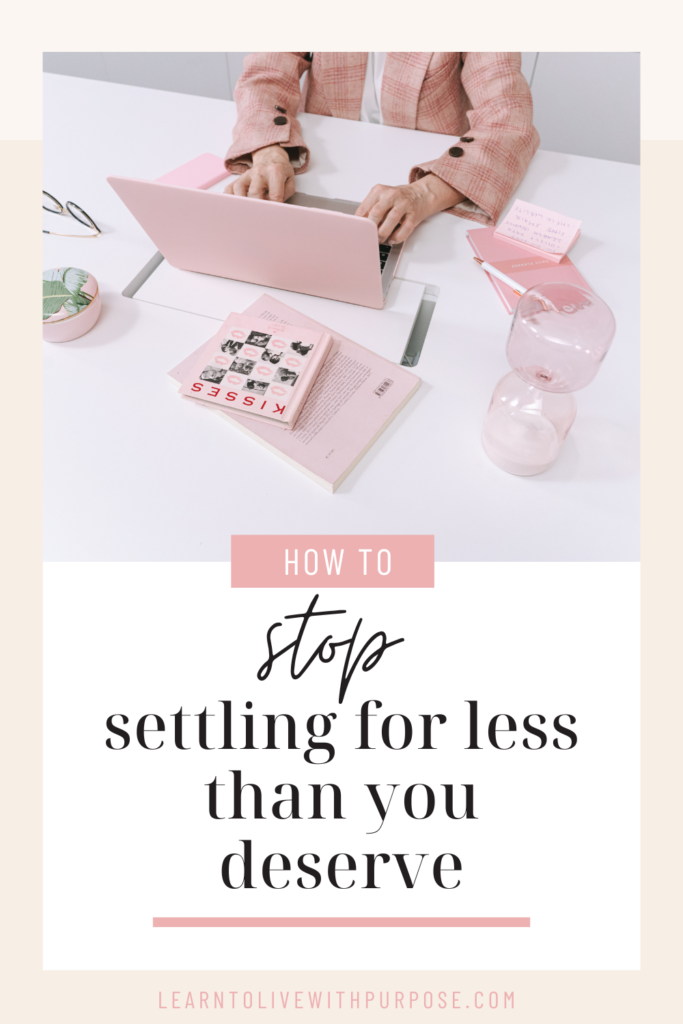
Related Blogs
How to overcome your fear and get what you want
Most of us understand that by comparing ourselves to others no good can come from it. Yet whether we’re comparing physical features, accomplishments or paychecks we still do it all the same. 🙃
Comparing yourself to others is one of the easiest ways to feel bad about yourself. It makes you feel jealous, inadequate and not important.
According to social comparison theory, we do this in an attempt to make an accurate evaluation of ourselves, but at what cost? 😮💨
Sometimes comparison can be more generic like wishing you were taller, but more often than not it’s about something the other person is capable of doing and wondering why you’re not achieving the same results as they are even though your stalk level is on 100. 😂

Maybe Rachel has more subscribers on her YouTube channel than you and maybe Rebekah can afford to buy more of the latest fashion trends than you can. Comparison can sometimes be motivating but more than not it can be destructive.
There is one thing you will always be better at than anyone else in the world and that’s being YOU.
This is the only way you can truly win.
We are biologically programmed to put a greater emphasis on the negative (AKA Negative bias).
Therefore, comparing yourSELF to somebody else’s SELF (which is your overall “worth” as a human being – to others) will only end badly.
Now! let’s look at why you should stop comparing yourself to others and how you can live your best life. 💁♀️
Harnessing the power of comparison
In order to harness the power of comparison you need to be able to constrain the negatives and make use of the positives – such that it propels your forward rather than holding you back.
Well… how do I do that?
You can do this by not comparing yourself to others in counterproductive ways that open the door to negative thoughts.
If someone is where you want to be, whether it’s your career goal, business goal, monetary goal etc. You must look at what they’re doing with an honest eye, with the only goal of learning from the comparison and using what you learn to help raise your standards to be in a better standing of achieving your goals.
Comparing the uncut reality of your life to the highly edited version of someone else’s life is going to make anyone feel like crap. Who needs this? Definitely not you. 🙅♀️
Instead of being motivated, attending network events or making headway on a project, you’re in your room curled up under your blanket wondering why your life isn’t going as well as someone else’s.
The majority of the time it’s usually people we don’t even know! This creates an instant loss of momentum all because you allowed yourself to fall into this common trap of negative comparison.

No one has a perfect life
Everyone experiences problems and challenges in their life. No one is exempt from this. Especially through social media, it’s easy to for people to pretend they lead an amazing life with no downsides – know that this isn’t true.
What people present to the outside world is usually an edited version of their reality. 🤷♀️
When someone asks you “How are you doing?” you’re unlikely to say “I’m about to lose my mind, my boyfriend is driving me absolutely crazy and I feel like a failure”. Instead you’d probably hold your tongue and say “everything’s fine, how are you?”
People are less likely to reveal their negative emotions than their positive emotions.
This could be for a number of reasons such as:
👉 You don’t want people to pry in your private life
👉 You don’t feel close enough to the person who’s asking you how you’re doing to give an honest answer
👉 You don’t want to burden the person with your problems
👉 You don’t think the person will understand your situation
👉 You feel ashamed of the situation that you’re in
👉 You don’t like asking for help
You’ll always lose
If comparing is how you value your worth, you will always lose, and I guarantee whoever is reading this is not a loser.
What makes life amazing and fascinating is learning from the hard work and talents of others. Instead of trying to be as good or better than others focus your energy on being the very best version of yourself.
Next time you catch yourself using someone else’s life as a benchmark of your own self-worth remind yourself of how ineffective and destructive this thought process is.
Instead redirect your energy and attention to your own goals and what is required to achieve them.
How to break the habit of comparing yourself to others
Gratitude
If you concentrate on what you don’t have you will never have enough. Whenever you find yourself looking at what people have, remind yourself of everything you should be grateful for in your life.
For me, that means appreciating the roof over my head, the clean running water I get to drink, my fabulous friends and family and many others.
There are so many things that you can be grateful for if you really sit down and think about it. So shift your focus from what you don’t have, to what you do have.
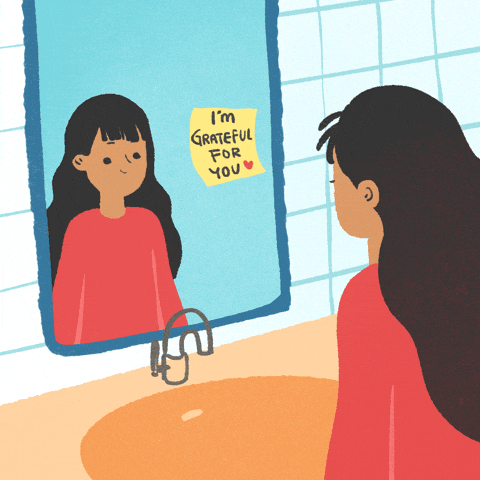
Be aware
Most of the time social comparisons are done without you even realising you’re doing it.
Make these thoughts conscious by bringing these thoughts to the forefront of your consciousness by being on the lookout for these types of thoughts.
Once you’ve trained your mind to be consciously aware of when you start negative social comparison allow yourself to “pause”.
Don’t allow yourself to feel bad, just acknowledge the thought and gently shift focus.
Focus on your own life’s journey
Life is a journey, not a competition. There’s no leader board of “Who has the best life”. We are all on a journey to live a life of purpose full of fulfillment, self-discipline and gratitude.
That journey has nothing to do with what other people are doing or what they have. What you have and where you want to go is all you need to worry about.

Compare yourself with you
If you need to compare yourself with someone, make that person be yourself.
How can you improve yourself? How can you be more loving towards other people? What can you do to make today better than yesterday?
Comparing your previous self with your current self can help how show you the growth you have made, and if you haven’t made any growth you are now consciously aware that changes need to be made. Allowing you to become a better version of yourself.
To summarise...
Avoid letting comparison breed envy, self-doubt and other negative energy into your life. Use the power of comparative thinking to your advantage and turn it into positive energy and critical thinking about the fulfillment of your own life and what you need to do to find and live your purpose in life.
I hope you enjoyed this post on how to stop comparing yourself to others!
Pin this post for a reminder 📌 👇
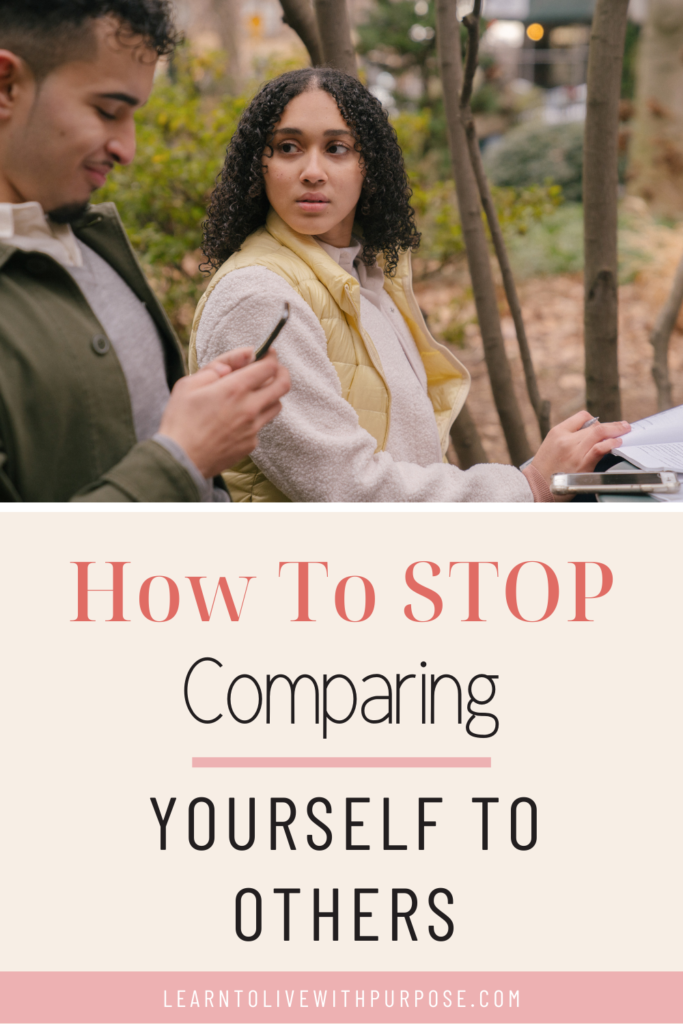
Related Blogs
The ultimate guide for coping with change
Your sense of self-esteem impacts EVERY area of your life. Your relationship with your family, your significant other, your career, your physical and mental health are all reflections of your self-esteem.
Even though having high self-esteem is indeed a good thing it’s only good in moderation. Having very high self-esteem – like that of a narcissist- isn’t something to aim for.
Even though people with very high self-esteem feel great about themselves they tend to be extremely vulnerable to criticism and negative feedback about themselves and their work.
When you take everything personally and avoid constructive criticism like the plague, you stunt your growth. You’re never going to stop making mistakes, so choosing to ignore the help of someone showing you the right way will affect you negatively in both your personal and professional life.
The only way to learn is to accept guidance and feedback. You’ll be doing yourself a great disservice if you believe you know it all and no one can do it better than you because the reality is… there’s someone else out there that is.
Why is building self-esteem so important?
The more self-esteem you have the more “inner stability” you have. When your opinion of yourself goes up you stop trying to seek validation and attention from others.
Your level of self-esteem influences the choices and decisions that you make. In other words, self-esteem serves as a motivational function by making it more or less likely that you will take care of yourself mentally, physically and emotionally.
When you have low self-esteem you may hide away from going to social events, avoid things you find challenging and be hesitant to try anything new. In the short term, avoiding anything that takes you out of your comfort zone will make you feel safe at the time but in the long term it will eventually backfire. This is because you’re reinforcing underlying doubts and fears. You’re essentially teaching yourself that the only way to cope is by avoiding things.
Here are a few ways to help build your self-esteem so that you can thrive and live a life that reflects who you truly want to be.
You deserve it girl!
Change your story
We all have a narrative or a story that we have created about ourselves that shapes our self-perceptions which our core self-image is based on. Your level of self-esteem may have grown or been reduced by how people have treated you in your past. The good news is that you have control when it comes to increasing your self-worth. If you want to change your story you have to understand where it came from.
For example, was it a teacher who made you made you doubt your academic abilities? Changing your belief on not being good enough is pretty hard. When you decide to change the story about yourself you look into your past to see if there is evidence of the new story you want to create.
Continuing with the example above, if you have successfully completed school with excellent grades and moved onto higher education, this alone shows you that you have accomplished a lot despite what was said about you in the past, you then start to realise that you’re carrying a false narrative of yourself around.
“Sometimes automatic negative thoughts such as “you’re lazy” or “you don’t do anything right” can be repeated in your mind so often that you start to believe that it is true” says Jessica Koblenz, Psy.D. “These thoughts are learned which means that can be unlearned.”
When you label yourself as “not that person” that can achieve XYZ, you limit yourself on what you’re capable of achieving. Letting go of life-changing opportunities because you doubt that you have the capabilities to do well is only going to keep you in your box of safety wondering what life is like on the other side of living your true potential.
You’ve got one life, go get everything you deserve.
Identify your triggers
To increase your level of positive thinking, you need to recognise what places, people and things spark negative thinking. Is it that bad vibe “friend” that’s always got something to say about something or that annoying co-worker who’s always telling you what to do even though it isn’t their job? You can’t change certain situations, but you can change the way you react to them.
The next time you get mad, anxious or sad write down what caused it. After a time, you will start to see a pattern of what your triggers are and what you’re able to do about them.
When we know our emotional triggers, we can choose not to expose ourselves to situations that affect us negatively and harm our mental health.
We are not in control of what other people do, we can only control our thoughts and actions. Next time you’re sitting in a situation that you don’t want to be in, sit back and ask yourself:
Why am I here right now?
Is me being in this situation going to impact me negatively or positively?
The answers to the questions should tell you what your next action should be.
Acknowledge your success
Usually, people with low self-esteem disregard their success by chance. People with high self-esteem take the time to celebrate their success. They appreciate the praise given by others and thank them for their acknowledgment instead of downplaying it.
Your success was not by chance, it was thorough hard work, dedication and persistence. You deserve to re receive every reward, recognition and praise that comes your way.
When you acknowledge what you’re good at, you become more confident about yourself, making you more likely to continue doing what brings you joy.
Whether you acknowledge your success by going out to dinner with friends, having a spa day, or buying something that’s been sitting in your online basket for days, take that time to enjoy how far you’ve come.
Recognising your success is a powerful motivator that reinforces the meaning behind all the hard work that you have done. This in turn boosts your self-esteem and motivates you to take the next step towards achieving the next goal.

Recognise that you are not your circumstances
Learn to differentiate your circumstances and who you are as a person. We are all born with infinite potential. To believe we are anything less than that is a false belief that is learned over time.
It’s not uncommon to think that what has happened to you reflects who you are. Didn’t get the job offer you wanted, now you’re not good enough. Messed up your diet, and now you’re someone who has no self-discipline.
FALSE
Taking a situation and associating it with who you are can only lead to your downfall. Controlling what happens to you is not easy, life gets in the way and can throw you off course. No matter what your circumstances may be, you have to learn to start separating who you are and what you think about yourself from what happens to you.
Someone who is devoted to going to the gym and keeping fit can still miss a day and eat snacks. Someone who is good at their job can still get fired.
Everyone wins some and loses some. Do not become your loses.
Celebrate the small stuff
You got up on time this morning. Tick. You flipped your omelette perfectly. Tick. Your downward dog was better than last week. Tick.
We’ve been conditioned to only celebrate the big milestones and achievements and not acknowledge the “trivial wins” as they’re deemed as non-significant. This is far from the truth.
You’re really celebrating your habits. You’re celebrating the person you’re becoming by continuing your good habits. When you show appreciation for your small victories you show appreciation to yourself.
Celebrating your small wins is a great way to build confidence and feel better about yourself while at the same time keep you motivated to carry on. Every success you earn is a success to your overall dream. You wouldn’t have got to where you are now without all those small wins, so acknowledge them and celebrate them.
Let me leave you with one last valuable tip…
One way for people with low self-esteem to start to appreciate what it would be like to have higher self-esteem is to consider how they feel about the external things they value in life. E.g. Some people really love buying, collecting and using make-up because it’s important to them.
They take pride in their collection and school people on the texture and application of different products. They watch countless makeup videos to help perfect their look and try new ideas because that’s their idea of heaven. Self-esteem is like that, except that love and proudness you feel is targeted at yourself.
Related blogs
How to improve your life one day at a time
Did you know that people on my email list sometimes get exclusive discounts on my products? Join the community and save yourself some coins!
Freshly-squeezed inspiration, and no-nonsense tips + tricks to improve your life delivered to your inbox weekly.
Subscribe to my newsletter
Subscribe
You're all signed up!
Be sure to whitelist our email address so that all the goodies make it to your inbox.

